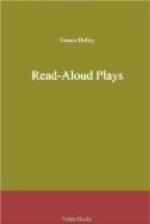INTRODUCTION
The first two or three of these “plays” (I retain the word for lack of a better one) began themselves as short stories, but in each case I found that the dramatic element, speech, tended to absorb the impersonal element of comment and description, so that it proved easier to go on by allowing the characters to establish the situation themselves. As I grew conscious of this tendency, I realized that even for the purpose of reading it might be advantageous to render the short story subject dramatically, since this method is, after all, one of extreme realism, which should also result in an increase of interest. As the series developed, however, I perceived that something more than a new short story form was involved; I perceived that the “read-aloud” play has a distinct character and function of its own. In the long run, everything human rises or falls to the level of speech. The culminating point, even of action the most poignant or emotion the most intimate, is where it finds the right word or phrase by which it is translated into the lives of others. Every literary form has always paid, even though usually unconscious, homage to the drama. But the drama as achieved on the stage includes, for various reasons, only a small portion of its own inherent possibility. Exigencies of time and machinery, as well as the strong influence of custom, deny to the stage the value of themes such as the Divine Comedy, on the one hand, and of situations which might be rendered by five or ten minutes’ dialogue on the other, each of which extremes may be quite as “dramatic” as the piece ordinarily exploited on the stage. By trying these “read-aloud” plays on different groups, of from two to six persons, I have proved that the homage all literature pays the drama is misplaced if we identify the drama with the stage. A sympathetic voice is all that is required to “get over” any effect possible to speech; and what effect is not? Moreover, by deliberately setting out for a drama independent of the stage, a drama involving only the intimate circle of studio or library, I feel that an entire new range of experiences is opened up to literature itself. Nothing is more thrilling than direct, self-revealing speech; and, once the proper tone has been set, even abstract subjects, as we all know, have the power to absorb. Thus I entertain the hope that others will take up the method of this book, the method of natural, intimate, heart-to-heart dialogue carried on in a suitable setting, and with attendant action as briefly indicated; for the discovery awaits each one that speech, independent of the tradition of the stage, has the power of rendering old themes new and vital, as well as suggesting new themes and situations. Indeed, it is in the confidence that others will follow with “read-aloud” plays far more interesting and valuable than the few offered here that I am writing this introduction, and not merely to call attention to a novelty in my own work.




